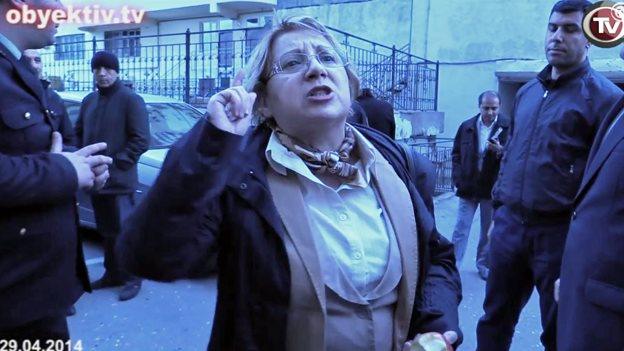Azerbaijan 'silencing critics' by detaining activists
- Published
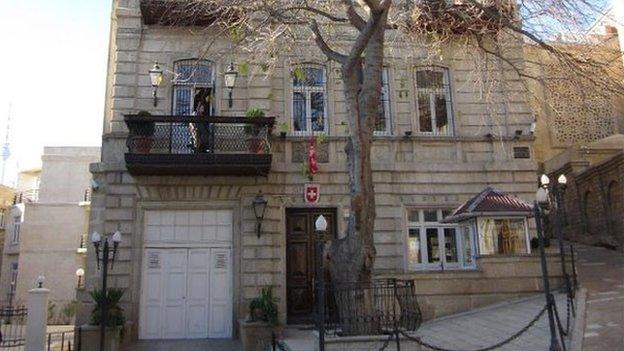
The Swiss embassy in Baku has been sheltering Emin Huseynov on humanitarian grounds
He appeared at the Swiss embassy in Azerbaijan's capital, Baku, in full disguise: his dark hair dyed blond to look more European.
It worked. He managed to walk pass the Azeri police that guard the embassy and was admitted onto foreign soil.
For over six months, the whereabouts of Emin Huseynov, a prominent human rights campaigner, were unknown, until the Swiss broadcaster SRF broke the news last week that the country's embassy in Baku had been sheltering him since August 2014.
The Swiss foreign ministry has confirmed that an Azeri national has been allowed to stay at the embassy on humanitarian grounds and in a statement said that Switzerland was negotiating with the Azeri authorities to resolve the issue "in the interest of the individual".
Mr Huseynov, the founder of the Institute for Reporters' Freedom and Safety (IRFS), a non-governmental organisation monitoring rights violations against journalists, is accused by the Azeri government of tax evasion and abuse of power.
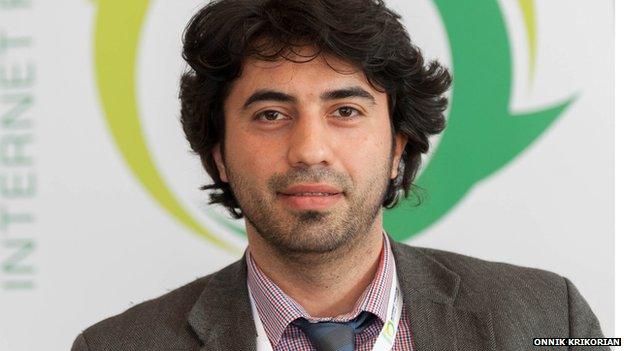
Emin Huseynov went into hiding six months ago
Similar charges have been brought against a number of other civil society activists - charges that rights groups describe as "bogus".
Like most pro-democracy NGOs, Mr Huseynov's IRFS was under surveillance by the Azeri security services.
Branded 'traitors'
Activists like Mr Huseynov and others currently in detention - such as Rasul Jafarov, human rights lawyer Intigam Aliyev, Leyla and Arif Yunus, and Anar Mammadli - have for years openly criticised their government, raising awareness of human rights abuses in the oil and gas-rich country.
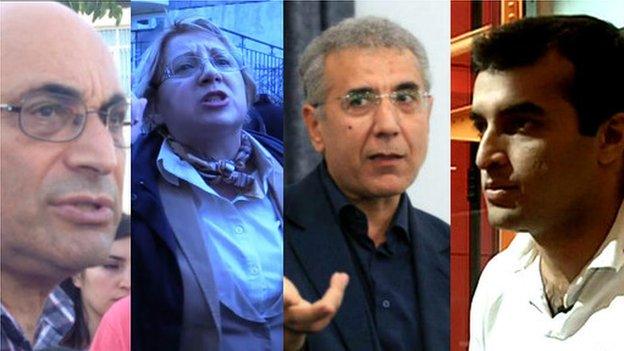
Activists Arif Yunusov, Leyla Yunus, Intigam Aliyev and Rasul Jafarov have been held since mid-2013
They have earned recognition for their work from the international community. But Azeri officials, such as President Ilham Aliyev's chief adviser Ramiz Mehdiyev, have branded them "traitors".
The most recent victim of the government's campaign to silence its critics is the investigative reporter Khadija Ismaylova, known for her corruption investigations into the financial schemes of Azerbaijan's president and his family.
In December 2014, she was charged with inciting a man to commit suicide. Last week, she was additionally charged with embezzlement, tax evasion and abuse of power.
Her colleagues, whom I met in December in Baku, described her detention as an attempt to silence her.
"By arresting Khadija, the government is sending a message to journalists and to the public in general that those who fight for truth and free speech, those who fight for their rights, will be arrested." said Kamran Mahmudov, who briefly stood in for Ms Ismaylova on her popular radio talk-show on US-funded Radio Liberty.
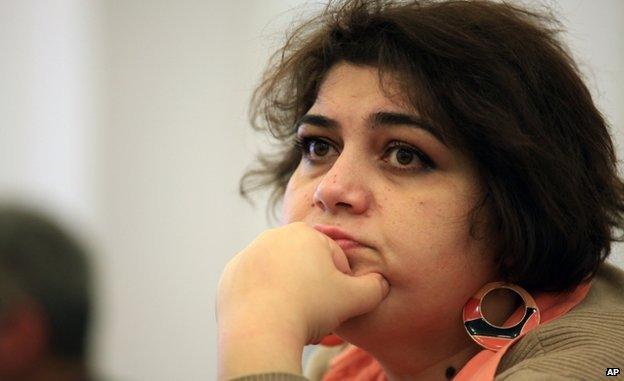
Radio Liberty journalist Khadija Ismaylova has been held since December
A few weeks after this interview, the authorities raided the offices of Radio Liberty and took the station off air.
Still in his pyjamas, Kamran Mahmudov was dragged out of his home by the police and taken for questioning.
The closure of one of the few remaining independent voices in Azeri media was criticised by the US State Department, the EU and several human rights organisations.
According to the New-York based Committee to Protect Journalists, external, Azerbaijan is the leading jailer of journalists in Europe and Central Asia.
However, the government insists that all the charges against journalists and civil society activists are legitimate.
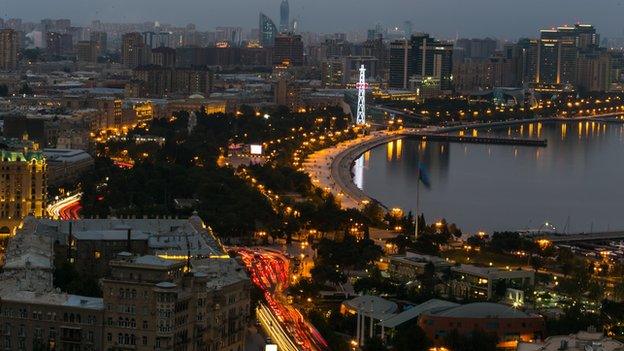
Azerbaijan chaired the Council of Europe last year, a decision that angered the country's critics
"No one is prosecuted in Azerbaijan based on his or her professional activities or political beliefs," said Hikmat Hajiyev, a spokesman for Azerbaijan's foreign affairs ministry.
"Khadija Ismaylova has been engaged in journalistic activities for more than 10 years and could write different stories. Now there is a real criminal case based on the criminal code of Azerbaijan," he added.
"It is so unfortunate that the human rights issue is being politicised, and certain groups and circles under the pretext of human rights are trying to interfere in the internal affairs of Azerbaijan."
Bright minds behind bars
President Aliyev pardoned 87 prisoners shortly before the new year, among them two journalists and two members of a pro-democracy youth movement.
But most of the activists, journalists and lawyers detained remain behind bars. They face long prison terms if found guilty of their charges.
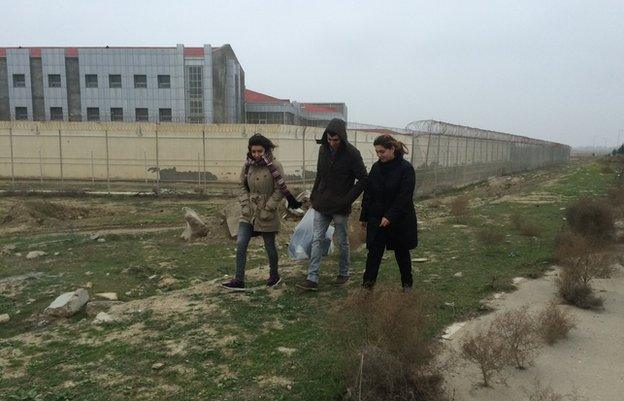
Intigam Aliyev's family visit him at Kurdakhany prison, where he has been held for several months
Human rights lawyer Intigam Aliyev, who has taken several hundred cases - ranging from violating rights to freedom of speech and the right to a fair trial - to the European Court of Human Rights, is now on trial himself, with his hearing set to resume on February 17.
The Kurdakhany detention facility on the outskirts of Baku, where he is being held, has been dubbed "the university" because most of the bright minds deemed a threat to the state are being held there.
Shortly after visiting him in December, his son, Necmin, wanted to deliver a message from his father to the outside world.
"In today's Azerbaijan defending human rights is a crime," he said. "He and his friends are paying the price for doing just that."
- Published13 October 2014
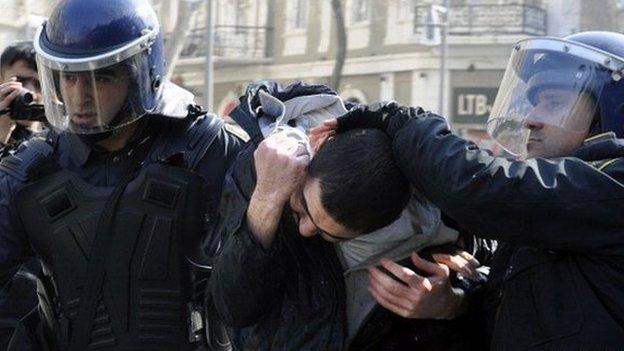
- Published29 May 2013
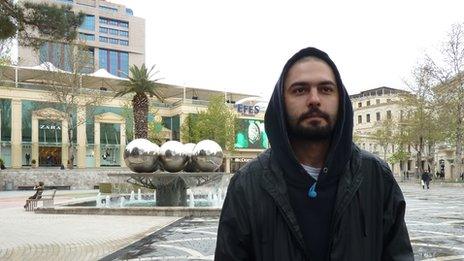
- Published29 April 2014
